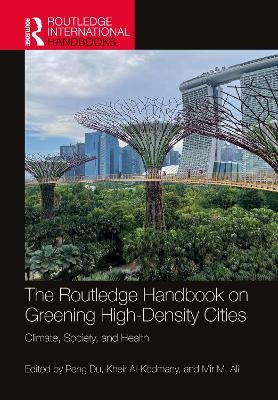
The Routledge Handbook on Greening High-Density Cities
Routledge (Verlag)
978-1-032-33142-3 (ISBN)
This new handbook provides a platform to bring together multidisciplinary researchers focusing on greening high-density agglomerations from three perspectives: climate change, social implications, and people’s health. Written by leading scholars and experts, the chapters aim to summarize the “state-of-the-art” and produce a reference book for policymakers, practitioners, academics, and researchers to study, design, and build high-density cities by integrating green spaces. The topics covered in the book include (but are not limited to) Urban Heat Island, Green Space and Carbon Sequestration, Green Space and Social Equity, Green Space and Public Health, Biophilic Cities, Urban Agriculture, Vertical Farms, Urban Farming Technologies, Nature and Biodiversity, Nature and Health, Biophilic Design, Green Infrastructure, Urban Revitalization, Post-Covid Cities, Smart and Resilient Cities, Tall Buildings, and Sustainable Vertical Cities.
Peng Du is an assistant professor and director of the Master of Urban Design – Future Cities Program at the College of Architecture and Built Environment in Thomas Jefferson University and a Research Fellow of Jefferson Institute of Smart and Healthy Cities. He also serves as the Asia Regional Director of the Council on Tall Buildings and Urban Habitat (CTBUH). Kheir Al-Kodmany is an expert in vertical urbanism, sustainable design, geographic information systems (GIS), visualization systems, public participation, and crowd management. He is a professor of Urban Planning at the University of Illinois at Chicago (UIC) and previously worked for the Chicago firm Skidmore, Owings & Merrill (SOM). Mir M. Ali is professor emeritus and former long-time chairman of the Structures Division in the School of Architecture at the University of Illinois at Urbana-Champaign and has extensive industrial experience that includes Skidmore, Owings & Merrill (SOM) and Sargent & Lundy in Chicago. He is a fellow of the American Society of Civil Engineers and the Council on Tall Buildings and Urban Habitat (CTBUH).
Foreword by Wong Mun Summ Introduction: Greening High-Density Cities: Towards Sustainable and Resilient Urban Habitats 1. Cities’ Match-Making: Fostering International Collaboration For Climate-Resilient Twins 2. An Analysis of the Potential Role of Controlled Environment Agriculture in Dense Urban Developments: A Case Study of Chicago 3. Mitigating Climate Change: The Potential of Vertical Farming to Feed High-Density Cities 4. A Modular Greening Intervention in Sydney CBD: Variation and Optimization through Evolutionary Computation 5. Greening High-Density Texas Cities: Ecological Grounds for an Adaptive Climate Approach 6. Greening the Gray and Dense Center of São Paulo, Brazil: From Green Roofs to Disputed Fragments of Green Spaces 7. Overcoming the Planning Gap by Greening the City: From Designing for the Past to Anticipating Future Climates 8. Inhabiting, Expanding, and Greening: The Previ Housing Development Approach 9. Juan Diaz River Basin Study Case: How To Green a High-density City 10. Greening Buildings, Open Spaces and Infrastructures: Circular and Regenerative Climate Actions Linking Environmental with Social Aspects 11. Urbanizing the Amazonian Rainforest: A Multi-Objective Urban Model for Rainforest Cohabitation 12. The Social Imperative of Urban Greening 13. Beyond Upgrading: Rental Densification as a Pattern for Urban Greening 14. The Role of Green Space in Urban Growth and Social Equity in Dallas, Texas 15. Greening of Sociable Spaces and Buildings in Postindustrial High-Density Cities 16. Daily Accessed Street Greenery in High-density Built Environments: A Comparative Study of Major Chinese Cities 17. Stratified Public and Green Spaces in High-density Urban and Hybrid Environments: A Review of Three Case Studies in Singapore 18. How Tall and How Green Can a Vertical Mall Be? Case Studies of East Asian Cities 19. Public Green Spaces in CBDs: Reconsidering the Central Business District of Istanbul 20. Three Possibilities for Landscape Urbanism in Middle Eastern Cities 21. High-Density Green Cities for Socio-Environmental Sustainability 22. Greenspace and Respiratory Health: A Systematic Review and Analytical Framework 23. The Impacts of Urban Green Spaces on Mental and Physical Health in Dense Urban Settings of Chicago 24. Improving Population Health through Green Space Design 25. The Healing Serendipity: The Therapeutic Value of Interval Biophilic Restoration in High-Density Cities 26. Greening Indoor Workplace in High-density Cities: A Quantitative Study of Indoor Workplace Greenery to Improve Health and Productivity Performance 27. Living Tracks Chicago: The Bronzeville and Englewood Trails 28. A Soundscape Approach: Transformation of Negative Spaces Near Urban Transportation Corridors for Active Use 29. Promoting Health in Dense Cities through Vertical Greeneries: The Case of Plant- and Tree-Covered Tall Buildings 30. Greenery Building: A Path to Sustainable Urban Living 31. Light, Air, And Views: The Underappreciated Health Benefits of Balconies 32. Gardens, Greenbelts, Parks, and Permanent Furniture for the City: Recovering Ebenezer Howard and Frederick Law Olmsted for Future High-Density Cities 33. Planning the Dense and Healthy City for All: Access to Green Spaces in Densification Projects
| Erscheinungsdatum | 13.06.2024 |
|---|---|
| Reihe/Serie | Routledge International Handbooks |
| Zusatzinfo | 42 Tables, black and white; 33 Line drawings, black and white; 146 Halftones, black and white; 179 Illustrations, black and white |
| Verlagsort | London |
| Sprache | englisch |
| Maße | 178 x 254 mm |
| Gewicht | 1330 g |
| Themenwelt | Naturwissenschaften ► Biologie ► Ökologie / Naturschutz |
| Technik ► Architektur | |
| Technik ► Bauwesen | |
| ISBN-10 | 1-032-33142-9 / 1032331429 |
| ISBN-13 | 978-1-032-33142-3 / 9781032331423 |
| Zustand | Neuware |
| Informationen gemäß Produktsicherheitsverordnung (GPSR) | |
| Haben Sie eine Frage zum Produkt? |
aus dem Bereich


